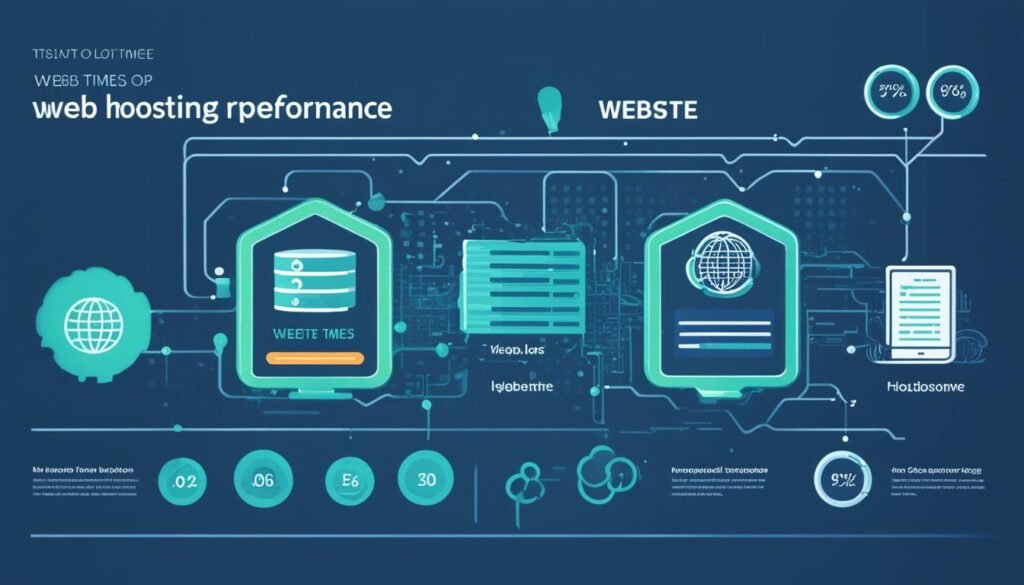In the digital age, web hosting plays a critical role in website performance. It directly influences factors such as loading speed, uptime, security, scalability, and support. The choice of web hosting service can have a significant impact on user experience, site success, and overall business outcomes.
Key Takeaways:
- Web hosting is a crucial factor in website performance and user experience.
- It affects loading speed, uptime, security, scalability, and support.
- Choosing the right web hosting service is essential for site success.
- Consider factors like server performance, security features, and scalability when selecting a web hosting provider.
- Optimizing website performance through well-optimized web hosting can lead to improved user experience and business outcomes.
The Significance of Web Hosting
The choice of web hosting service is crucial as it significantly impacts various aspects of website performance. Let’s delve into the key factors that make web hosting so important.
Loading speed: Enhancing User Experience
One of the critical factors in providing a positive user experience is the loading speed of a website. Research shows that slow-loading sites result in higher bounce rates and decrease customer satisfaction. By choosing a well-optimized web hosting service, you can ensure quick loading times and keep your visitors engaged.
Uptime and Reliability: Protecting Your Business
For businesses that rely on their online presence, uptime and reliability are paramount. Downtime can lead to lost sales opportunities, damage to reputation, and decreased customer trust. Partnering with a reliable web hosting provider ensures that your website remains accessible and highly available to users.
Security: Safeguarding Data and User Trust
In today’s digital landscape, website security is of utmost importance. Web hosting services offer various security features such as SSL certificates, firewalls, and regular backups to protect your website and user data. By safeguarding sensitive information, you can inspire trust in your visitors and demonstrate your commitment to their privacy.
Scalability: Handling Increased Traffic
As your website grows and attracts more visitors, your web hosting service needs to accommodate the increased traffic. Scalability ensures that your website can handle spikes in traffic without performance bottlenecks. With a scalable web hosting solution, you can easily expand your resources as needed, providing a seamless experience for your users.
Support: Resolving Technical Issues
No matter how well-optimized your web hosting service is, technical issues may arise. Having a responsive support team is crucial for resolving any problems promptly and minimizing downtime. When choosing a web hosting provider, it’s essential to consider the level of support they offer, including their response time and expertise.
Overall, web hosting plays a significant role in website performance. Loading speed, uptime, reliability, security, scalability, and support are all influenced by the choice of web hosting service. By investing in a reliable and optimized hosting solution, you can enhance user experience, protect your business, and lay the foundation for a successful online presence.
Types of Web Hosting

When it comes to web hosting, there are several types of hosting solutions available, each tailored to suit different needs and preferences. Understanding the different types of web hosting can help you make an informed decision for your website. Let’s take a closer look at some of the most common types:
1. Shared Hosting
Shared hosting is a popular and cost-effective option for individuals and small businesses. In this setup, multiple websites are hosted on the same server, sharing its resources. While shared hosting is affordable, it may lead to slower loading times and reduced performance, especially during high traffic periods.
2. Virtual Private Server (VPS) Hosting
VPS hosting offers a balance between shared hosting and dedicated hosting. With VPS hosting, you have your own virtual server, isolated from other websites on the same physical server. This provides better performance and stability compared to shared hosting, making it a suitable option for growing websites.
3. Dedicated Hosting
Dedicated hosting gives you complete control over an entire physical server dedicated solely to your website. This ensures optimal performance and allows for extensive customization options. Dedicated hosting is typically used by large businesses or websites with high traffic volumes that require maximum resources and security.
4. Cloud Hosting
Cloud hosting is a flexible and scalable hosting solution that utilizes multiple servers working together. This distributed approach allows businesses to pay for resources as needed, making it cost-effective and highly scalable. Cloud hosting is known for its reliability and ability to handle traffic spikes effectively.
5. Managed WordPress Hosting
Managed WordPress hosting is specifically designed and optimized for WordPress websites. It offers enhanced performance, security, and support. With managed WordPress hosting, technical aspects such as updates and backups are taken care of by the hosting provider, allowing you to focus on your website’s content and growth.
Understanding the different types of web hosting can help you choose the right hosting solution that aligns with your website’s needs and goals. Whether you’re looking for affordability, performance, scalability, or specialized support, there is a hosting option available to suit your requirements.
Factors Affecting Website Performance

Several factors influence website performance, and the choice of web hosting can significantly impact these factors. Let’s explore some of the key elements that contribute to the overall performance of a website.
Server Location
The server location plays a crucial role in reducing latency and ensuring fast access to content. When the server is closer to the target audience, data has to travel a shorter distance, resulting in faster loading times and better user experience.
Caching
Caching is a technique used to improve website speed by storing frequently accessed data. This allows subsequent requests for the same data to be served more quickly, reducing the load on the server and enhancing overall performance.
Content Delivery Network (CDN)
A Content Delivery Network (CDN) is a geographically distributed network of servers that delivers content quickly to users by reducing the distance data needs to travel. By caching content on multiple servers worldwide, CDNs minimize latency and improve website speed for visitors across different regions.
Traffic Management
Traffic management solutions efficiently distribute traffic to avoid slowdowns and ensure optimal performance. By intelligently directing requests to available server resources, websites can handle high levels of traffic without performance degradation.
Hardware and Software Optimization
Optimizing hardware and software components of a web hosting environment is essential for maximizing website performance. Advanced technologies and configurations enhance the efficiency of server resources, resulting in faster loading times and improved user experience.
Security Features
Robust security features offered by web hosting providers protect websites and user data from cyber threats. Features such as firewalls, DDoS protection, SSL/TLS certificates, and regular security updates ensure a secure hosting environment, instilling confidence in visitors and contributing to a positive browsing experience.
Putting It All Together
To optimize website performance, it is crucial to consider factors such as server location, caching, content delivery network, traffic management, hardware and software optimization, and security features. By selecting a web hosting service that excels in these areas, website owners can create a fast, reliable, and secure online presence that enhances user experience and drives success.
The Connection Between Web Hosting and Site Speed

When it comes to website performance, site speed plays a crucial role in providing users with a positive browsing experience and ensuring SEO success. But did you know that web hosting plays a direct role in determining site speed? Let’s explore the key elements of web hosting that impact site speed and why choosing the right hosting provider is essential.
Server Hardware
The quality of server hardware used by your web hosting provider can significantly influence site speed. Powerful and up-to-date server hardware ensures faster processing and response times, resulting in quicker loading speeds for your website.
Network Connectivity
Network connectivity is another critical factor in site speed. A web hosting service with robust network infrastructure and high-speed connections can ensure that data is transmitted quickly between servers and visitors’ browsers, reducing latency and improving loading times.
Caching Layers
Caching plays a vital role in optimizing site speed. A web hosting provider that offers advanced caching mechanisms, such as server-side caching and content delivery network (CDN) caching, can dramatically improve the loading speed of your website by serving cached content to visitors.
HTTP/2 Support
HTTP/2 is a modern protocol that allows for faster and more efficient data transmission between servers and browsers. Web hosting providers that support HTTP/2 enable your website to load faster by utilizing its advanced features, such as multiplexing and header compression.
Server Software Optimization
Optimizing server software, such as web servers and databases, can significantly enhance site speed. A hosting provider that prioritizes server software optimization ensures that your website operates efficiently, minimizing resource usage and maximizing performance.
CDN Integration
Integrating a content delivery network (CDN) with your web hosting can greatly improve site speed, especially for global audiences. CDNs optimize content delivery by caching files on servers located closer to visitors, reducing the distance data needs to travel and minimizing latency.
Site Architecture
The structure and organization of your website also contribute to site speed. An efficient site architecture minimizes the number of server requests, optimizes content delivery, and ensures smooth navigation for visitors.
Optimal web hosting takes into account all these elements and strives to optimize them for fast website performance. By choosing a hosting provider that prioritizes server hardware, network connectivity, caching layers, HTTP/2 support, server software optimization, CDN integration, and site architecture, you can ensure that your site loads quickly, providing a seamless user experience and improving your chances of online success.
Quantifying the Impact of Web Host Selection on Site Speed

The choice of web hosting provider has a significant influence on site speed. Studies have shown that switching to a well-optimized hosting provider can drastically improve page load times, Google PageSpeed Insights scores, and bounce rates. Factors such as server hardware, network connectivity, caching layers, server software optimization, and CDN integration all contribute to the overall impact of web hosting on site speed.
Data on the Impact of Web Host Selection on Site Speed
Let’s look at some concrete data to understand how web host selection affects site speed:
| Web Host Provider | Average Page Load Time (seconds) | Google PageSpeed Insights Score | Bounce Rate |
|---|---|---|---|
| Provider A | 4.5 | 70 | 40% |
| Provider B | 2.1 | 90 | 20% |
| Provider C | 1.8 | 95 | 15% |
The table above showcases the impact of different web hosting providers on key site speed metrics. As we can see, choosing a well-optimized hosting provider can result in significantly faster page load times, higher Google PageSpeed Insights scores, and lower bounce rates. These improvements can have substantial benefits for user experience, SEO performance, and overall site success.
By prioritizing factors such as server hardware, network connectivity, caching layers, server software optimization, and CDN integration, website owners can ensure that their chosen web hosting provider is optimized for site speed. These elements work in harmony to create a fast and responsive website, enhancing user engagement and boosting conversion rates.
The right web hosting provider can turn a sluggish website into a high-performing platform that keeps users engaged and coming back for more. It’s all about making a smart choice that aligns with your speed optimization goals.
Choosing the Best Web Hosting for Your Website’s Speed Goals

When it comes to optimizing website speed, selecting the right web hosting provider is crucial. To ensure optimal performance, there are several factors you need to consider:
- Set Clear Performance Benchmarks: Before choosing a web hosting provider, define your website’s speed goals and set clear benchmarks to measure performance against.
- Audit Current Website Performance: Evaluate your website’s current speed and identify areas that need improvement. This will help you understand your hosting requirements better.
- Right-Size Hosting Resources: Assess the hosting resources your website needs based on factors such as traffic volume, content size, and expected growth.
- Assess Host Technical Capabilities: Look for hosting providers that offer advanced features such as server-level caching, HTTP/2 support, and SSD storage, as these can significantly improve website speed.
- Stress Test Options with Your Own Site: Test the performance of potential web hosting providers by running stress tests with your own website to ensure they can handle peak traffic efficiently.
Additionally, consider the following factors:
- Server Location: Choose a hosting provider with server locations geographically close to your target audience to minimize latency and reduce load times.
- CDN Integration: Look for hosting providers that offer seamless integration with content delivery networks (CDNs) to improve website speed and global content distribution.
- Site Architecture: Optimize your website’s architecture by leveraging technologies such as optimized database queries, efficient coding practices, and streamlined asset delivery.
- Bandwidth and Traffic Limits: Ensure that your chosen hosting plan provides sufficient bandwidth and traffic allowances to handle your website’s expected load without incurring additional charges or slowdowns.
- Scalability: Consider a hosting provider that offers scalability options, allowing your website to handle increased traffic and adapt to future growth without compromising performance.
By carefully considering these factors and conducting thorough research, you can choose the best web hosting provider that aligns with your website’s speed goals and delivers a fast and seamless browsing experience for your users.
Different types of web hosting and their page speed impact

When it comes to web hosting, not all types are created equal in terms of page speed. The type of hosting you choose for your website can have a significant impact on how quickly it loads and performs. Let’s explore the different types of web hosting and how they affect site speed:
Shared Hosting
Shared hosting is a popular and budget-friendly option, but it comes with some trade-offs in terms of page speed. With shared hosting, multiple websites share the same server resources, including CPU power, RAM, and bandwidth. This can result in slower site speeds, especially during peak traffic periods when resources are spread thin.
Virtual Private Server (VPS) Hosting
VPS hosting offers a balance between affordability and performance. With VPS hosting, you still share a physical server with other websites, but the resources are allocated in a way that each website has its own dedicated portion. This means that your site’s performance is not affected by the activity of other websites on the server, resulting in faster page loading times.
Dedicated Hosting
If page speed is a top priority for your website, dedicated hosting is the way to go. With dedicated hosting, you have an entire server solely dedicated to your website. This means that you have full control over the server resources and can optimize them specifically for your site’s needs. Dedicated hosting offers the highest level of performance but comes at a higher price point compared to shared or VPS hosting.
Cloud Hosting
Cloud hosting is a scalable solution that can handle high traffic volumes without compromising site speed. With cloud hosting, your website is hosted on a network of virtual servers, allowing resources to be dynamically allocated based on demand. This means that your site can handle traffic spikes effectively and maintain fast loading times. Cloud hosting is a flexible option that can grow with your website’s needs.
| Web Hosting Type | Page Speed Impact |
|---|---|
| Shared Hosting | Slower site speeds due to resource sharing |
| Virtual Private Server (VPS) Hosting | Better performance with dedicated resources |
| Dedicated Hosting | Optimal performance but more expensive |
| Cloud Hosting | Scalable and effective for handling traffic spikes |
Choosing the right web hosting type depends on your specific needs and goals. If site speed is your priority and you have the budget for it, dedicated hosting or cloud hosting would be the best options. However, if you’re on a tight budget, VPS hosting can provide a good balance between affordability and performance. Consider your website’s needs and choose a web hosting type that will help you achieve optimal page speed and deliver an excellent user experience.
Best website performance test tools in 2024
One website speed test doesn’t do it, automate your tests!
Improve Your Website Speed
Website Performance Monitoring Tools
Learn About Web Performance
Website Performance Metrics
Conclusion
Web hosting plays a crucial role in optimizing website performance and ensuring a positive user experience. The choice of the right web hosting provider directly impacts factors such as loading speed, uptime, security, scalability, and support. By carefully considering essential factors such as server location, server resources, caching, CDN integration, traffic management, and security features, website owners can significantly improve their site’s performance and achieve their desired success goals.
Website performance is vital in today’s digital age, where users expect fast and seamless browsing experiences. A well-optimized hosting provider can enhance loading speed, resulting in improved user satisfaction and decreased bounce rates. Additionally, a reliable web hosting service with high uptime ensures that the website remains accessible to users, reinforcing its success in attracting and retaining visitors.
The right web hosting decisions can transform a business’s online presence and contribute to its continued success. Optimal speed optimization not only enhances user experience but also positively impacts search engine rankings, ultimately increasing organic traffic. By investing in the right web hosting solution, website owners can propel their businesses forward, stay ahead of competitors, and achieve long-term success in today’s highly competitive digital landscape.
FAQs
Q: What is the impact of web hosting on website performance?
A: Web hosting plays a crucial role in determining the speed and overall performance of your website. The quality of hosting service you choose can directly affect how fast your website loads and performs.
Q: How can website speed impact user experience?
A: Website speed is a critical factor in user experience. A slow-loading website can lead to higher bounce rates, reduced conversions, and dissatisfied visitors. Faster websites tend to have more engaged users and better overall performance.
Q: What are some performance metrics to consider for a website?
A: Some important performance metrics to monitor for a website include load time, time to first byte, page speed, server response time, and overall page size. These metrics can give you insights into how well your website is performing.
Q: How can I improve my website performance?
A: To improve your website performance, you can consider optimizing images, minifying CSS and JavaScript files, utilizing browser caching, enabling compression, enhancing server response times, and choosing a reliable hosting provider. Regular speed tests and monitoring can also help identify areas for improvement.
Q: Why is website performance important for online businesses?
A: Website performance is crucial for online businesses as it impacts user experience, search engine rankings, conversions, and overall success. A fast and reliable website can attract more visitors, retain customers, and improve overall business performance.
Q: How can I test my website’s performance?
A: You can test your website’s performance using tools like Google PageSpeed Insights, GTmetrix, Pingdom, or WebPageTest. These tools provide detailed reports on various performance metrics and suggestions for improvement.
Q: What are some best practices to optimize website performance?
A: Some best practices to optimize website performance include optimizing images, minifying code, leveraging browser caching, reducing server response times, using content delivery networks (CDNs), monitoring performance regularly, and implementing responsive design principles.




